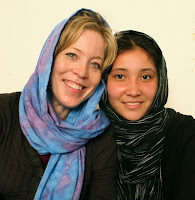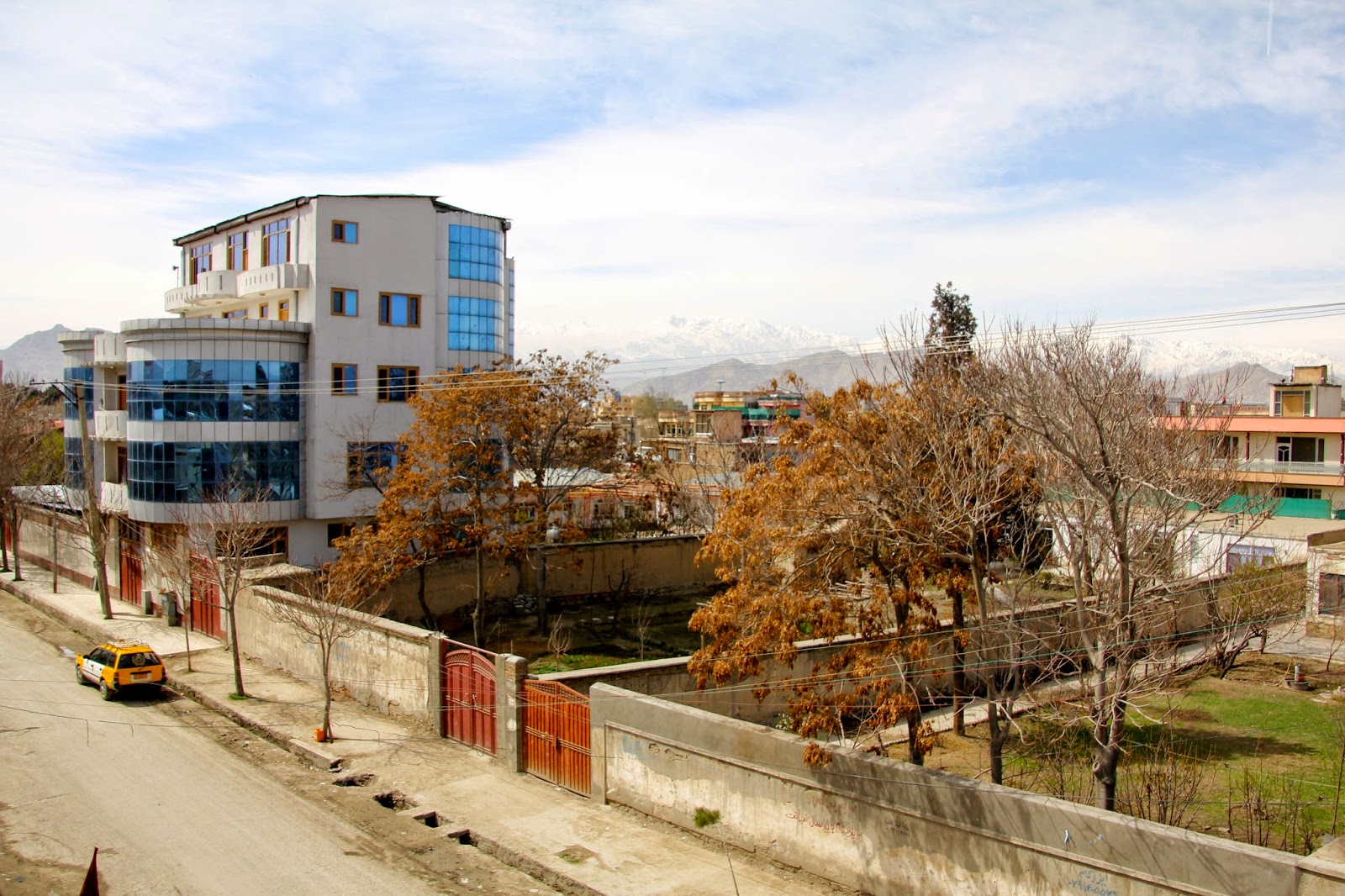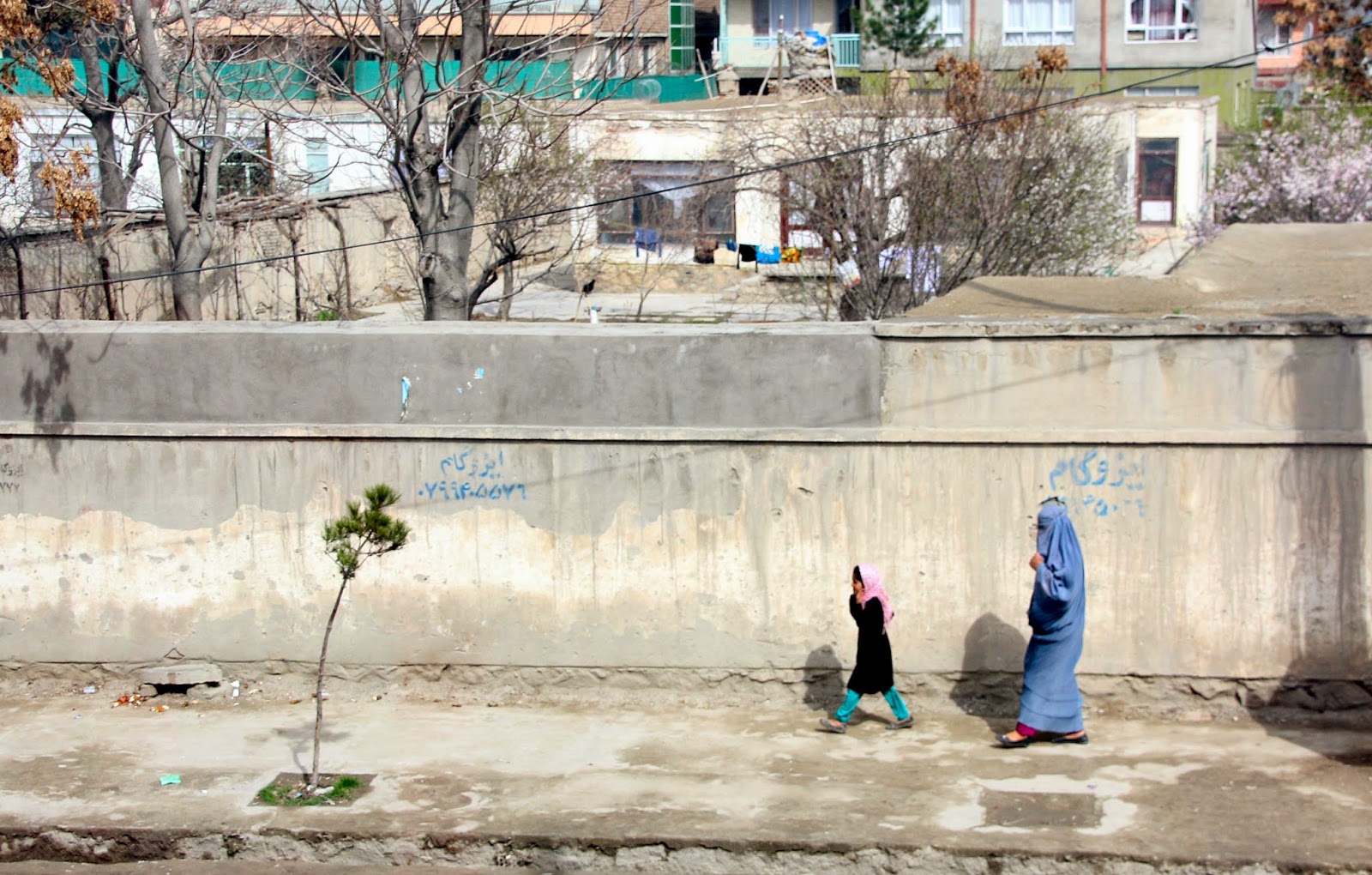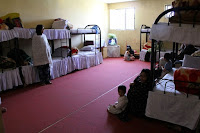Our work in the Herat prison began with a performance and is
continuing with workshops. Here I will share with you what it is like inside an Afghan women's prison and why the women are there.
The Prison
The women’s prison is in a different compound from last time
we were here. Their prior location was adjacent to the men’s prison and was
needed for overflow of male prisoners. It’s a good thing they moved, as there
had reportedly been a problem with sexual abuse by the male guards, and now the
women have their own separate
location with only female guards. In addition, the new compound looks less like
a prison. Instead of being stuck within a concrete enclosure with bars on the
windows and heavy metal doors, the women can move freely between buildings and
the surrounding open space of the courtyard. Laundry hangs to dry between a few
trees. The 140 women sleep in communal dorm rooms with bunk beds, colorful
blankets, and television. They don’t wear uniforms like in American prisons;
they wear personal clothing as well as jewelry and make-up. This already makes
for a more humane experience. From what I understand, the women can spend the
day as they wish, and have available various activities supported by different
NGO’s – tailoring, rugmaking, hairdressing, literacy classes, and an
agricultural program where they learn to plant vegetables.


We met with the director of the women’s prison, an affable but
authoritarian woman in her fifties. She told us she does not want the prison to
look like a prison but instead like a dormitory with supportive activities for
the women. She greatly welcomed our program.

This sounds very promising, and the conditions for the women
do not seem so bad. Still, it is a prison and the women do not have their
freedom. They are imprisoned within walls and don’t have control over their own
lives. Of course, for many this may not be very different from their prior
circumstances: many women in Afghanistan are not allowed to leave the house and
all their activities are controlled and restricted by their husband, father, or
brothers. Quite often they are beaten and abused. In fact, young women are
sometimes driven to such desperation that they try to commit suicide by setting
themselves on fire. The level of brutality that women and girls in Afghanistan
have to suffer is difficult to grasp. For some, prison must be preferable to
what they endured outside it. Even so, to be in prison carries stigma, knowing
you have been shamed and shunned by your community and family, stamped as a
criminal and punished by society. While before you were controlled by your
family, now you are controlled by the state. Your life is not your own. And
there is little hope for the future.
The Women
Given these difficult circumstances, many of the women are
depressed and suicidal. Some are self-harming and cut themselves. One day we
arrived for workshop and a woman came up to us and showed us her wrist, which
had two deep burn marks. She had burned herself with a cigarette. I asked, why did
you do that? She said, I was so full of angry feelings! She had wanted to see
the doctor and the guard wouldn’t let her. Our fellow workshop leader, one of
the young women from Simorgh Theatre, said she felt sick to her stomach when
she saw the injuries and she just couldn’t understand how this woman could do
this to herself. But in the face of such utter lack of control and power over
one’s life, this is sometimes the only way a person knows to cope and manage
intense feelings and distress. This is why we are doing the workshops, to give
these women an outlet in which they can express their feelings – and find more
constructive and creative coping mechanisms.
It is no wonder these women are depressed and frustrated
when one learns the reasons they are there in prison. Many if not most are in
prison for adultery--that is, they had sex outside marriage. This is a crime in
Afghanistan. A girl falls in love with a boy; they have relations; now they are
both in prison. Some women run away from home. This is not a crime per se, but
it is assumed that they engaged in illicit relations. It is almost impossible
for a woman to prove her innocence. Women routinely have to submit to virginity
tests, an extremely violating procedure that effectively proves nothing.
And certainly not if you are a married woman. In many instances, the women have engaged in
sex, but whether they were truly willing is questionable. It comes down to
this: if a woman wants to escape her home, she needs the help of a man. The
price for this is sex.
Why does an Afghan woman feel compelled to leave her home?
Primarily it's because of forced marriage and abuse. Many of the women in the
prison spoke of the problem of marrying too young. As I was repeatedly told, “a
daughter is a toy to her father and a slave to her husband.” But it does happen
that she runs away for love. A 17-year old girl in the prison ran off with a young man she loved, but since they now agreed to marry, they will both
be released. This is one story that has a happy ending, but other girls are not
so lucky. The boy no longer wants them, and now they are stuck in prison. After
that, where can she go? Often the family will not accept her and may even
threaten to kill her as she has now brought “dishonor” on them all.
It’s one thing to marry your lover in order to get out of prison, it’s another to have
to marry your rapist. Even in the
case of rape, a woman will be sent to prison for adultery! Because technically
she has had sex outside of marriage and how can she prove she wasn’t willing.
No one believes her. But if she agrees to marry her rapist, then all will be
forgiven. What a horrible choice to have to make.
If a married woman is raped, the husband will rarely be
able to accept it. In one recent case, a woman was raped by her husband’s brother, but
the husband accused her of having an affair. The brother fled to Iran. The
woman was sent to prison. She was pregnant but the husband refused to acknowledge the child as his and divorced her. She was released after eight months. The usual sentence
for adultery is 1-3 years. It is enough to be accused of infidelity by your
husband to get locked up. Many women and girls seemed to be in prison based
simply on someone’s accusation.
Some of the women are in prison for killing their husbands.
No doubt these are desperate acts. Many women in Afghanistan are married off very
young and then terribly abused by the husband and his whole family. But in some
cases, the woman loved someone else and together they conspired to kill the
husband and run away. The desperation is still there but the justification is
sometimes questionable.
It was challenging to learn the real reasons why the women
were in prison, because, we were told, the women will often make up stories
until they feel safe in speaking the truth, or if they think they might benefit
from it. But I also felt it was difficult to get accurate information from
those we spoke with in prison management and others in authority; they seemed
too ready to dismiss the women’s circumstances. I sensed some resistance to acknowledge
the problem of rape. They said they had never come across a woman in jail who
was there because she had been attacked, that the women all did it willingly.
And yet after further probing, complexities emerged that show how difficult the
situation is for women. They finally acknowledged the challenge that exists for
a woman to be able to prove her
innocence and how often she is in a compromised situation. The system is set up
to fail these women. No matter the crime or reason, the real problem is they
have very little chance to defend themselves or escape their circumstances.
Their Stories
The prison psychologist highlighted a few particular cases where
she felt the women really were innocent:
· One woman killed
her husband with the help of her 14-year old son, because the father was a drug
addict who tried to rape their 9-year old daughter. Now both the mother and her
son are in prison. The mother was sentenced to 16 years.
· A young woman had
been beaten by her father so severely in her childhood she didn’t walk until
she was six years old. When she got older her father wanted to marry her off,
but she refused. In a final act of desperation, she put gasoline on her father
and burned him. She is sentenced to 18 years.
· The psychologist
spoke to us also about kidnapping and how entire families are swept up in the
crime. A father and a brother may have conspired to kidnap someone for money.
The police then raid their house and arrest everyone: the mother, the
daughters, the sister-in-law, the grandmother, and everyone goes to prison.
There are two young women in prison now for this crime. One was jailed at age
14 and sentenced to five years.
These are the stories of the women we met:
· “A” has been in
prison two months now. She killed her father because he was forcing the mother
to have “temporary marriages” with other men (that is, sex for money). Finally
the daughter couldn’t take it any longer. She took her brother’s gun and shot
her father. Then she went to the police and said: “I have killed my father and
I am happy I did it!” She is ashamed that he was her father, and proud
she killed him so that her mother doesn’t have to be “married” to another man again.
"A" has a one-month old baby with her in prison. I don’t know how
long she has to stay there.
· B is a feisty and
outgoing young woman of 17 years old. She had an affair with a neighborhood
boy. A couple of months later she got married, but her husband discovered she
was not a virgin. So she said she had been raped. Her husband wanted to kill
the other boy. But the neighbor called the national army for help and said the
husband had a gun and also that he and B had stolen money. The national army
came and beat up the husband so he ended up in the hospital. B had an
altercation with the neighbor's daughter and cut her with a knife. Everybody
was arrested, including the neighbor's daughter because she knew about the
illicit relation and had not reported it, and was therefore accessory to the
crime. The husband has now been released as well as the neighbor's daughter,
but B and the neighbor boy were just sentenced to six months in prison for
adultery. A complicated situation! B has a lot of anxiety and nervous problems.
But she is very enthusiastic about the workshops and fully engaged. She’s our
star participant. She even stayed up one night until one a.m. teaching the
others in her room all the exercises she had learned!
· C is in her early
twenties and also very excited about our workshops and a main participant. She
has been in prison for 7 months and has a 10 month old daughter. Her situation
is a bit unclear. She had problems with her husband, and apparently he accused
her of stealing and got her put in prison. The husband has now divorced her.
She is about to be released and says her family supports her. But the first day
we met she said to me that she wanted to find a family to take care of her
daughter and give her an education, because if the daughter was left with her
father he would marry her off early as he did her. She is so inspired by the
workshops that she wants to continue doing theater when she gets out.
· D is 27 years old.
She was married at 15, but the husband became addicted to opium. He would beat
her and her child. She says her father and mother-in-law encouraged their son
to abuse her. They accused her of having sex with other men. She is now in
prison for one year. She is worried about her 11-year old daughter who is with
the in-laws; they don’t let her go to school and they hurt her. The daughter
comes to visit the mother every two weeks and begs to stay with her
in prison.
· E is in her late
forties and has a young child with disabilities. She has been active in all the
programs the prison offers. E has
been in the prison 10 months and is sentenced to 16 years for killing her
daughter’s husband. But she says she didn’t do it. I did not get to find out
further and verify her story. Perhaps she did do it, or perhaps someone else
did and she got the blame. Perhaps her daughter did it and she took the blame
instead. There are several situations like this where the man died and the wife
gets blamed for his death. There is little a woman can do to defend herself.
· F is 22 and
recently arrived in prison with her newborn son. She got there when her baby
was 10 days old. Her husband’s second wife had died suddenly, and now she and
her husband were accused of murder by the wife’s brothers. She is in
prison pending investigation and autopsy, and is hoping to be cleared.
· Then we have G who
is 19 and was working as a police officer in Kabul. One day her brother called
and said, “Congratulations! Your father has found a husband for you.” But she
did not want to get married, she wanted to go to the university and continue
her work. The family summoned her back to Herat. She met her prospective
fiancé, but did not like him – so she shot him. Just like that. A counselor asker her, "Your father and brother come to visit you in prison often, they seem to love you very much. Why didn't you just ask them to please not make you marry?" She
said, "I don't know, I just got so angry." She didn’t think the family would
listen to her. She has now been sentenced to hanging. And yet she always seems
to be in a good mood when we see her!
The women are very happy and smiling when we come, but this
doesn’t mean they aren’t in deep suffering. What Afghan women have to endure is
beyond what most of us can imagine. They are excited to see us because to them
it means somebody cares and they are happy for the attention. The women are especially excited that two foreigners from America have come all this way to see them and help them. One woman told us
“You are like a dream to us.”
The Children
The women have their children with them in prison. At first thought, this is very disturbing. But on the other hand, it's good for both the baby and mother to be together. Children
stay with their mothers until the age of 5, when they are placed in a child
support center run by a non-profit. We visited this center and will be doing
workshops there as well. It’s a good place and the children genuinely seem
well-cared for. This is really encouraging to see. They get to visit their
mothers every two weeks or so. The smaller kids who are with the mothers in the
prison get sent to a kindergarten every day, where government employees’
children go. This is also a new development and did not exist four years ago
when we last visited (as far as I know). Then the kids were just stuck in the prison. I’m glad to learn they now have the opportunity to get outside and socialize
with other kids. But a few of the children were always around when we were
there; it wasn’t clear to me why they didn’t go to the child center. There are
about 75 children living with their mothers in the prison. One girl was seven
years old, but otherwise mostly toddlers and babies. We had several little ones
crawling around us as we did our workshop. It was nice to see the women help
each other take care of the babies, so that the mothers could participate. Of
course, at times they had to take a break to nurse. Naturally, we accommodate
this.
We have to be flexible in conducting our workshops and give
consideration to the women’s circumstances. They are faced with daily
challenges, and sometimes they are just too depressed to participate. But we
have to keep showing up for them -- the workshops are ongoing so that they will
have this support available for the long term.
The entrance to the women's prison // Joanna and I with our two fantastic workshop leaders from Simorgh Theatre
(Click to view larger)
--
Next up: a little about the actual work we're doing with the women!


















































